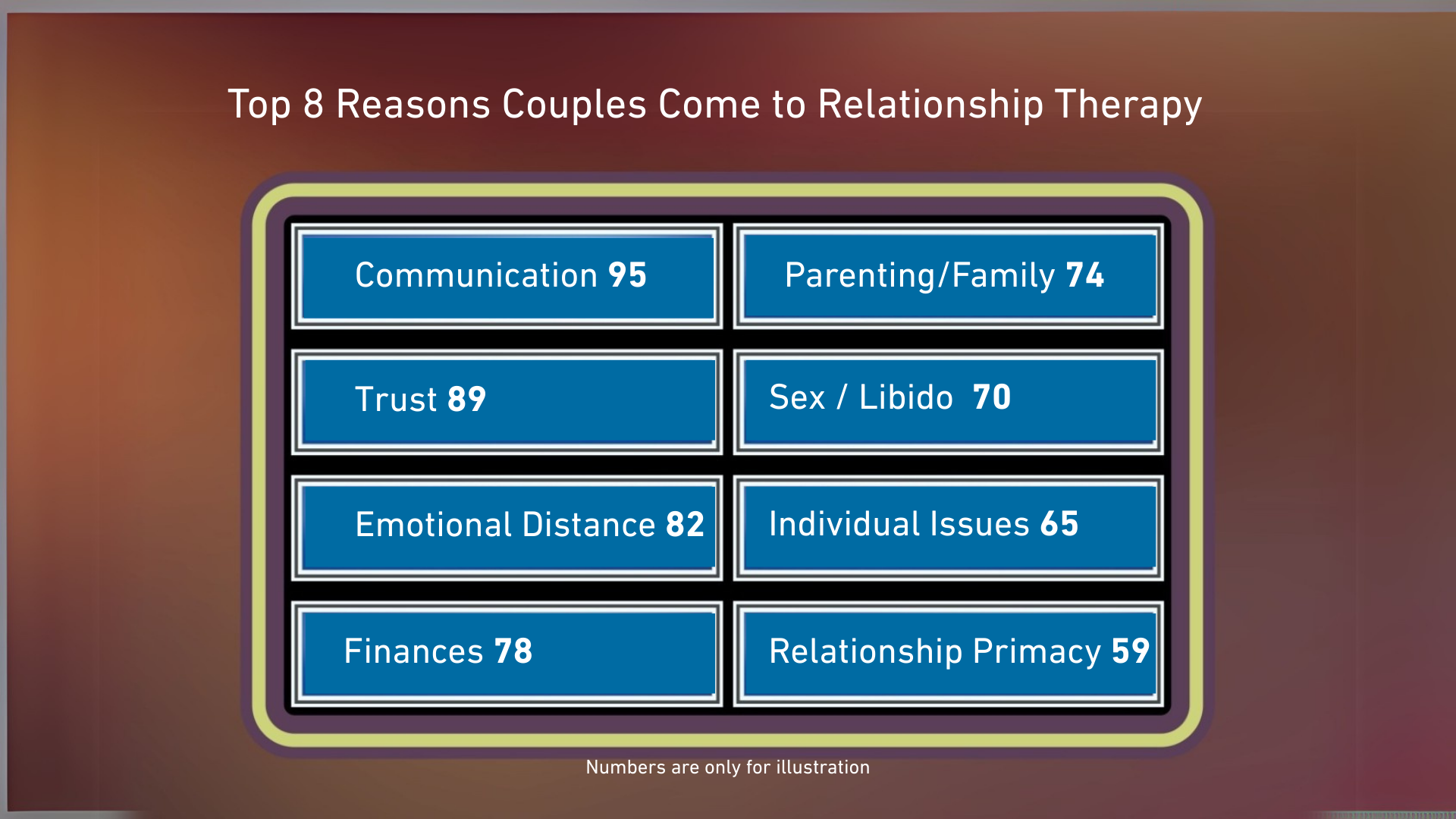Transcript
Hello, I'm Dan Gummo, the practice manager for Relate, and I'm here today with Steven Dromgool, our clinical director, and we're gonna talk through some of the things that come up in relationship counseling today.
When One Partner Wants Out
I wanna put a question past you, something that comes up every once in a while when we do consultations and it's really about couples. And if they're thinking about separating, how would you advise them to go about couples counseling and is it appropriate? For instance, you have a couple where they've been struggling for a long time and the one partner decides he is ready to go. Is it appropriate for them to do couples counseling where one person wants to be in the relationship and the other person doesn't?
What's the rule of thumb on that?
So people separate for lots of different reasons, and yeah, it's certainly common for us to get contact with someone. Generally one party who's just been told. You know that their partner wants to separate and sometimes it's a shock, sometimes it's not. And and often there's this sense of, like if they didn't know about it or even if they knew that there was some problem, that the sense of desperation of can I get my partner a to come and do counseling?
That certainly happens a lot. And, a lot of times, the question we're asking is, is a partner willing or open to do that? And quite frequently they are, just because someone wants to end a relationship doesn't necessarily mean that they stop caring about their partner and often, particularly with their kids involves or there's issues to be solved.
Most people have some recognition that you don't just decide to separate and then you're never gonna see that person again. My experience, this is a pretty common thing that happens. In that situation. I wonder if the one person wants to be out, but one person still really wants the relationship, like how much should they press the other person to give it a second chance?
Is that successful? Does it ever work? I think the that one of the things. I've had cases where people say, look, can you just give my partner a call? And just, and you try and convince them, which I always decline. But, because the person who's most likely to have influence is the partner themselves.
But what we are looking at, when people come in together but it's the same process if they're doing it by themselves, is what is the overlap of interest. Because if someone you know is leaving because they're engaged in a torrid love affair and those kind of things, they're emotionally like, they've exited the relationship.
So at that point in time, there's often not a lot of interest in doing work beyond how do we take care of the kids? How do we manage property separation? How do we do those kind of thing? So it really depends on the partner, but it's really, but. Even where there's been an affair or something like that, what we might be looking at is that areas where there is overlap of interest areas where there's overlap of care the areas where counseling tends to be a lot more productive is where you have something like the person's leaving because there's essentially they've lost hope.
They've been in the relationship. There's been some challenge that's been really difficult for them, and they're just like I just I can't do it anymore. And from that point of view in my experience, especially where it's the woman leaving, I. The success rates around therapy are often actually a lot higher.
So when a partner's leaving, not because they're out of love, but because something that's really important to them, they really haven't achieved getting their partner's attention and getting the sense of engagement with them about the issue. Often they're leaving as a wake up call and their partner is like holy crap they weren't just complaining. Again, this is really a deal breaker. And often at that point in time, they're oh, okay. And then they're calling us in a panic and and and they ask their partner if they're going to counseling.
I ask you, 20 times over the last five years, but often even in those cases, if the guy in this case then says, look look, I'm making the appointment for myself. I'd really appreciate as a favor to me if you would come along, even if it's just to talk about the kids, even if it's just to talk about the separation or even just to help me understand, what it was that I missed.
Then, in my experience that is successful quite a lot of the time, more than 50% of the time that's a successful kind of intervention.
Therapeutic vs. Trial Separations
I've heard you talk other places about how relationships are sticky and I wonder if in some of these cases it would be better if they did separate for a certain amount of time. I've heard you've talked about therapeutic separations, does that make any sense?
Yeah, it's that's an interesting kind of complex topic. Honestly. We should probably do a talk just on that by itself. One of the things that couples in distress will often come to me with is they're saying, look, this isn't going really well.
I think we should have a trial separation while we work. Try and figure out if we wanna be in the relationship or not. And in general, I tend to think that's a terrible idea. I. Okay. Because what happens is you're not really doing anything in terms of the relationship. It's often used as a soft let down in theory, even though it's not a soft let down where one person is okay, I wanna lead, but I don't wanna have those un.
Uncomfortable conversation. The theory being that if the person gets used to being separated over a period of time then when we do the real separation, then it's gonna be easier. But in practice, the embedded partner is then left in limbo in a state of high anxiety for however long the temporary separation is.
And then, often at that point of real exhaustion physical and emotional exhaustion then gets that news that they've been dreading. That the separation is actually occurring. Whereas if there had been that sense about saying, Hey, I'm out. You can move through the shock, you can move through that process and, in that six weeks or two months, you would be in a substantially better place rather than just waiting on hold.
Therapeutic Separations May Help with Addiction Concerns
Therapeutic separations where we use them or recommend them are where couples are really engaged in the therapy, they're engaged in the work, but there is a significant agreed problem. So it's often an addiction problem or it's a, it's most often an addiction type problem or some kind of unmanageable kind of behavior.
And there's a sense of the couple's committed to doing the work, but there is process work that one or other of them, and often both of them need to get life back into manageability. And so the therapeutic se separation, has a time a frame attached to it.
There is a very clear therapy work schedule. There is normally contact within a therapeutic separation, there's a agreed parameters in terms of, relationships with other people, contact with other people, expected behaviors, and all of those kind of things. So it's a very different thing from a trial separation.
So yeah, where someone is really unclear about if they want to be in their relationship or, stay or go. I'll often say if someone's sitting on the fence, I would rather that they stay. Committed to staying and did the work or they actually left not a trial separation, but actually left because then you can change both of those decisions and but you're not staying in limbo because staying in limbo and ambivalence is pretty much the worst scenario for people.
Using the Stay or Go Worksheet
So Steve, we have a resource the Stay or Go Worksheet to help people ask questions of themselves. How would you suggest people use that to help them make a decision whether they do wanna stay in a relationship or not? The stay or go worksheet is really adapted from Mira Kirshenbaum's work. And what the worksheets are designed to do, is use the power of Excel, to take a really complex decision and break them down into more manageable chunks.
And what it often does is it means you can, you can go through the relationship, you can look at, is there physical violence that's happening in the relationship? Is there, on ongoing emotional or sexual infidelity happening in the relationship? Do you have a sense of attraction to your partner or connection to your partner? Do you have a sense that, if you're trying to get stuff done, that you can get your partner on board with that? Do you have persistent needs that are getting unmet in their relationship and they're all of those are important issues.
And then by taking the time to think about them and the impact of them and how they sit, it then allows you to be able to look at that, all of those disparate areas, each of which tends to be quite. Emotional and to, to quite quickly get a sense of how is the relationship actually going?
If you've got basically like massive red flags sitting all through the relationship, it gives you that sense of ah, okay, actually this is, that feeling I have of not wanting to be in the relationship makes a lot of sense because this relationship's really crappy right now.
Or you might go through and say, wow, okay, like I'm really upset about this particular thing, but there's a lot of this relationship that is really fantastic. And so then you are looking at, okay, we've got this one or two or three thing. Then you're saying basically, are these manageable?
Can we fix these? Or are these actual actually terminal? Are they actually relationship breakers? And and so what it does is it helps us the strategic and logical part of our mind. Be able to manage those without getting massively over flooded by the emotional centers.
Managing Perpetual Problems in Relationships
Dynamic cloud within the relationship. One more question on that. Gottman has a term, and I think it's something like perpetual problems where whoever's the late person in the relationship's probably always gonna be the late person, and there's very rarely ever like a true fix or solution for that.
So then the idea is like, how do you work through that? How is that similar or different to what you're just talking about with the Stay or Go worksheet? I. Yeah, so Gottman basically says that over two thirds of problems in relationship, 69% according to his research are problems unsolvable.
There's always gonna be one person who's more tidy, always gonna be one person who's more on time, always gonna be one person who's more of a saver than a spender in the relationship. So those aren't solvable problems. They're not, you're not fundamentally gonna switch around. You're never gonna get to a space where you know, you're exactly the same levels of tidiness, exactly the same levels of spending versus saving.
And what he's basically saying is the difference between the masters and disasters of relationship is that the masters find ways to resolve that, that don't threaten the relationship. And so the stay or go process is really looking at how well do you do that. So for instance, if you've got like an extrovert in introvert difference, you're gonna have someone who wants to go out and hang out with other people.
You know more what? Whatever that is. So if one person wants to go out once a year and one person wants to go out once a decade, the once a year person is the extrovert in that relationship. But if that one time going out a year causes a fight that lasts for six months. The couple is not managing that process well.
And so within the relationship they're gonna feel very controlled, stifled and they're gonna feel really bad if they wait five years before they get to go out. So in the stay or go workshop, you, a lot of it will be looking at things that actually are, how you as a couple have collaborated or not collaborated to resolve perpetual problems.
So for instance, to some extent fidelity emotional fidelity, people are gonna have different ideas about that. But Fidelity ties into our nervous system and our safety system. And so if you are with a partner who keeps threatening your sense of safety and security in the relationship, and you don't find a way to resolve that and establish primacy. For most people tends to become an unmanageable problem.
If you are looking at your sexual relationship, it's really normal that that people will have difference in terms of desire, frequency, all of those kind of things. I work a lot with infidelity and so we've had people where someone's come in and they've had an affair and their partner is so angry at them. And I'm saying, okay how's your sexual relationship been prior to the affair? And I, I've had multiple cases where it's we haven't had sex for five or 10 years. And I'm sitting there and it's did you guys talk about that? Oh no, not really. And I'm sitting there wondering what did you think was gonna happen?
And we're not blaming the person who didn't have sex, and in, in that case, this is a couple issue. They didn't solve that problem. The person, who's sitting there saying, holy shit, I feel unloved, I feel unmet, I'm really angry about this. And then talking about it.
They're just as responsible and whoever actually had the affair is responsible for that choice to have an affair. But, in the stay or go, what we are looking at is that sense of, whatever those perpetual problems are, how well did you actually solve them?
Examples of Irresolvable Relationship Problems
I coach people around getting prepared to be in a new relationship and this brings up a memory. So you were talking about perpetual problems, and how many of them can actually be resolved? and what can you work around? I think back to a relationship that I had where one among many problems, was I get seasonal affective disorder. My partner at the time was committed to family in Alaska. So that's where she needed to be. And I have seasonal affective disorder and in retrospect, I wish I knew that was an issue AKA need that I had before I got into the relationship because the relationship didn't really have a chance after that, regardless of everything else.
And so with that being said, Steve, how can you use that information to inform your decisions about relationships? That's such a great example. Dan, I had a, some, a somewhat similar thing where, I was in a relationship with someone who lived in a different country from where my children lived.
And there was a really significant crisis with one of my kids and I needed, to go and be with them. It was literally a life and death issue. And so life happens sometimes, and it's this, we have these often, these romanticized ideas that love will overcome. But life is shit sometimes there, there's stuff that can happen and I think sometimes running through that stay or go process can really validate and maybe just take some of the guilt off and that sense of "oh you failed " because this didn't work.
But it's also a process of recognizing, that for me it, the lack a value for me is, is about being connected to my kids and those those kind of things. And that can inform you in future relationships.
And I think it can help some that feel a little less personal. It's often not necessarily about the other person. Normally I'm the messy one in a relationship, but I've been in a relationship within which I was the tidy one, and I did not like being on the other side of that equation.
I just couldn't cope with that kind of thing. And so it's really recognizing like. We are who we are and we can either find ways to collaborate and manage those things. I remember, for me having some of that conflict around, cleaning and that and often the solution was like, get it cleaner and, I'm happy to work harder, pay a cleaner so I don't have to do that stuff. And my partner feels taken care of, and so this, that's an example of, you've got that perpetual problem of the messy untidy thing. That's a way to solve it. Now, some other people will be, there's no way in hell I'm letting anyone come into my house, I'm the one that needs to do the tidying.
It's okay, great. I suck at tidying. I'm really happy to cook.
So you are finding ways that will work for you, that will work for the relationship. And often that's where therapy can help because it's pretty common that people will come in and they get really entrenched in their view.
And because it gets really stressful, we move down into that quite reactive positional part of the brain. And so in therapy. What we can help people do is relax so that they can start thinking more collaboratively. And then sometimes as a therapist, we can seed some other possibilities simply because we have the advantage of seeing hundreds of couples resolve issues. I've learned heaps of creative stuff, brilliant stuff that people have learned in their own relationships.
And there's that option to be like, you guys thought about blah, blah, blah.
End of Transcript
So if you're interested, the Stay or Go Course is attached to the bottom of this webpage.
And if you do have some concerns with addiction that we mentioned sex and pornography use, or drugs and alcohol, we have a couple team members that specialize in that. So just email us and we'll get you connected. Thanks, Dan. All right, thanks Steve. Have a good one.





